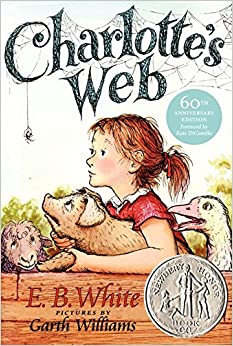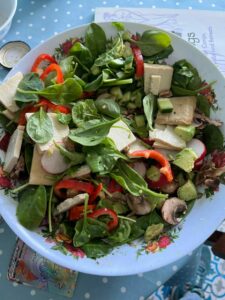
I try to be patient with the travails of parenting. Trust me, I have plenty of my own. But massive hypocrisies get my last nerve. See this parenting column from Slate:
Our sweet, funny, VERY sensitive just-turned 4-year-old daughter loves animals—and is right on the verge of figuring out where the meat we eat comes from. To be clear, we have never deliberately hidden this from her, but she has never expressly asked about it, and there’s no good way to randomly segue into “By the way, your dinner used to be alive.” She avoids eating chicken and turkey, and we’ve realized this might be because they’re called “chicken” and “turkey.” She does eat (with great joy) meats that don’t have the same name as their source animals, such as bacon, steak, and pot roast, but it’s clear from her comments that she doesn’t have a lock on what they’re made of. (“Dad, wouldn’t it be funny if bacon came from a pig like the ones that oink?!”) At some point soon, the jig will surely be up, and it is not unlikely there will be a lot of tears, some deep existential horror, and feelings of betrayal directed at us. If that’s the case, she’s also going to feel sad and mad about her conflicting feelings about whether to eat some of her favorite foods or not. How can we address this honestly while minimizing her distress? It seems like we should be preemptive about it, but how do we bring it up? For the record, we will tell her about vegetarianism and would be happy to stop feeding her meat if she asked (while ensuring that she gets enough protein and other nutrients, of course). We also do make an effort to purchase cruelty-free meat whenever possible, but I’m not sure that “Hey, the pig had a pretty nice life until someone killed it so we could have it for breakfast” is going to impress her.
And see the “great” advice to facilitate the hypocrisy:
I know I don’t have to tell you not to dismiss her feelings when she discovers the truth about her meals. I do urge you to be truthful with her about how you feel about eating meat. I think being honest with our kids, always, is foundational to being good parents.
The bottom line, though, is that you can’t really minimize her distress, and, as much as we want to protect our children from pain and sorrow and conflict, we shouldn’t protect them from all pain and sorrow and conflict. If we do, they’ll never learn the coping skills all people must develop to deal with these feelings. The best thing you can do is sympathize with her and be supportive. If she tells you she is going to be a vegetarian from now on, talk to her about how you’ll have to make sure her nutritional needs are met by finding other sources of protein that she likes eating. (This could be a fun project, trying new foods and cooking together. I know it was for us.) Your job as a loving parent in this situation, I believe, is to support her decision, whether it lasts a few days, weeks, years, or forever.
I remember this coming up, with some nervous chuckles, in parenting groups I attended when Rio was little: people embarrassed when their kids pointed out to them that they use the same word for the nuggets they are served and for the cute farm animal (“chicken.”) A breathtaking variant is the person who doesn’t like the animals on their plate to look like what they are, which is animals.
Conflicted? Embarrassed? Giggling about your own hypocrisy? Facing your child’s tears upon learning that you are participating in something horrific for animals and for the planet? Go no further! I have some advice to offer you, offered in all caps for those who need special clarity:
IF YOU ARE UNCOMFORTABLE SHARING WITH YOUR CHILDREN THAT MEAT COMES FROM ANIMALS, DON’T EAT ANIMALS.
IF YOU FEAR YOUR CHILD WILL BE DISTRESSED WHEN THEY LEARN THAT THEY ARE EATING ANIMALS, DON’T FEED THEM ANIMALS.
IF IT EMBARRASSES YOU TO TELL YOUR CHILD “HOW YOU FEEL” ABOUT EATING ANIMALS, STOP EATING THEM, AND THEN YOU’LL FEEL FINE.
IF YOU DON’T KNOW WHAT TO TELL YOUR CHILD ABOUT EATING ANIMALS, DON’T EAT THEM, AND THEN TELL THEM WHAT I TELL MY SON: “ANIMALS ARE OUR FRIENDS AND WE DON’T EAT OUR FRIENDS.”
That’s fucking it.
A few recommendations for books to read with your child:
- Mathieu Ricard, Jason Gruhl, Becca Hall, Our Animal Neighbors
- Jason Gruhl and Ignasi Font, Everything Is Connected
- Abioseh Cole, Kayleigh Castle, I Am Not Food
- E.B. White and Garth Williams, Charlotte’s Web
- Smitri Prasadam-Halls and Katherina Manolessou, T-Veg
Essential viewing for you:
Also, enough already with the fucking protein. It’s not the struggle/challenge that people make it out to be. Kids need 1-1.5 g protein for every 2 lbs of weight. If you feed them good food, they are getting enough protein. Kids all over the world happily eat beans and tofu and their parents don’t fret about protein. Why don’t the animal eaters ever ask themselves about vitamins and fiber?
Thanks for listening to my TED talk.




1 Comment
Oh, how I loved reading this! I came upon this as I was looking for age appropriate explanations to give my 4 and a half year old about how eating meat hurts animals. We don’t eat meat and she is very aware of that but everyone else she knows does. She asked why we don’t eat meat and I said because we don’t want to hurt animals. But, she, obviously, hasn’t made the connection yet that meat is an animal. While I want to be honest with her, I was looking for a gentle way to explain it, as if there is one…